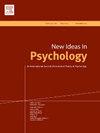新兴成人ADHD在社会关系中的认同与披露
IF 2.9
3区 心理学
Q2 PSYCHOLOGY, EXPERIMENTAL
引用次数: 0
摘要
本探索性研究利用体现的概念来研究患有ADHD的新成人如何决定在社会关系中披露或隐藏他们的ADHD,以及这些决定在多大程度上受到耻辱感和残疾身份的影响。因此,本文的主要目的是从他们的具身角度来研究新出现的ADHD成年人何时以及为什么会在社交场合透露他们的诊断。这些发现是根据在线调查收集的定性数据得出的,调查对象是60名年龄在18岁至29岁之间的新兴成年人,其中大多数来自美国。研究的问题是:(a)初出期的成年人是否认为ADHD是他们具体化身份的重要组成部分?(二)他们如何决定披露?参与者解释了他们做出披露决定的原因和具体方式,尤其是在人际关系中,并向其他人提出了建议。回应表明,决定披露他们的诊断与他们的ADHD体现和对精神疾病耻辱的看法密切相关。参与者明确地挑战了他们需要始终如一地就自己的多动症进行沟通的想法。许多人表示,他们意识到自己的行为往往表现得与他人不同,这种自我认知是披露演算的一部分。结果还强调了ADHD的识别是一个重要的前景因素,因为几乎所有的参与者都将ADHD纳入他们的身份。本文章由计算机程序翻译,如有差异,请以英文原文为准。
Emerging adults’ identity and disclosure of ADHD in social relationships
This exploratory study utilized the concept of embodiment to examine how emerging adults with ADHD decide to disclose or hide their ADHD in social relationships and to what extent these decisions are influenced by perceptions of stigma and disability identity. Thus, the primary purpose of this paper is to study, from their embodied perspective, when and why emerging adults with ADHD disclose their diagnosis in social situations. The findings draw on qualitative data collected by online surveys of 60 emerging adults ages 18 to 29, most from the United States. The research questions were: (a) do emerging adults consider ADHD an important part of their embodied identity? (b) how do they decide to disclose? Participants explained the reasons for and the contextual way they approached disclosure decisions, especially in relationships, and made recommendations for others.
Responses suggest that decisions to disclose their diagnosis are intimately linked to their embodiment of ADHD and perceptions of mental illness stigma. Participants explicitly challenge the idea that they need to communicate consistently about their ADHD. Many expressed awareness of how their behaviors are often embodied differently than others, and this self-perception is part of the disclosure calculus.
Results also highlight Identification with ADHD as an important foreground factor, as almost all participants include ADHD into their identity.
求助全文
通过发布文献求助,成功后即可免费获取论文全文。
去求助
来源期刊

New Ideas in Psychology
Multiple-
CiteScore
4.80
自引率
3.80%
发文量
37
期刊介绍:
New Ideas in Psychology is a journal for theoretical psychology in its broadest sense. We are looking for new and seminal ideas, from within Psychology and from other fields that have something to bring to Psychology. We welcome presentations and criticisms of theory, of background metaphysics, and of fundamental issues of method, both empirical and conceptual. We put special emphasis on the need for informed discussion of psychological theories to be interdisciplinary. Empirical papers are accepted at New Ideas in Psychology, but only as long as they focus on conceptual issues and are theoretically creative. We are also open to comments or debate, interviews, and book reviews.
 求助内容:
求助内容: 应助结果提醒方式:
应助结果提醒方式:


